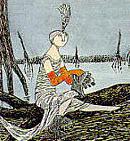History of English Studies Page"If literary criticism is ever to conceptualize a new disciplinary domain, it will have to undertake first a much more thorough reflection on the historical category of literature; otherwise I suggest that new critical movements will continue to register their agendas symptomatically, by ritually overthrowing a continually resurgent literariness and literary canon. At the same time it is unquestionably the case that several recent crises of the literary canon--its 'opening' to philosophical works, to works by minorities, and now to popular and mass cultural works--amounts to a terminal crisis, more than sufficient evidence of the urgent need to reconceptualize the object of literary study."This page and its rationale were authored by Rita Raley in 1995. There are primary documents on site by Thomas B. Macaulay; John Henry Newman; Adam Sedgwick; Hutcheson Macaulay Posnett; Mary Wollstonecraft; Raymond Williams; Gayatri Spivak; Gauri Viswanathan; D.J. Palmer; Chris Baldick; Franklin Court; Brian Massumi; Avital Ronell; and others. These pages are fully searchable. Last revised: September 2002
Related Web Pages of mine:
Catalogue of Primary Documents:
Excerpt taken from part 2, on the study of ancient literature and the need to make the study of languagues a part of our earliest study, so as to gain access to the "intellectual treasures of a nation." Sedgwick also stresses that the function of the university is to "teach profoundly" not superficially. After receiving four requests for information about Posnett (which I take to be quite a few), and given the text's virtual unavailability, I decided to mount a few excerpts from the sections on "world-literature" and "national literature." The text is public domain, but so few copies exist that xeroxing is basically out of the question; thus I have had to select passages that I think most relevant to the historical foundations of comparative literature.
Written two years after the "crisis" at Cambridge, this is quite a nice reflection on the continuing controversies within English studies. Williams uses an anecdote of a friend's impermissible utterance at an "open" encounter group (in California, no less) both to provide an analogy for the limits contained within a syllabus and to argue that, in the case of a debate over syllabus reform, one must say the unutterable and wrest one's interlocutors out of their particular language game. Also interesting is Williams' use of the figure of a palimpsest-like map of English literature, one that contains layers of a "selective tradition" carved out by generations of scholars. The "substratum" of this imagined map is the crucial issue of the English language. Excerpts from an essay collected in In Other Worlds (1987). Interesting to me in that critical reading and pedagogy become the means of fusing "theory" and the "practical-historical"; teaching literature, then, means teaching students to "read the world." Great metaphor describing teachers of literature: "the disc jockeys of an advanced technocracy" (with the illusion that we're free to play), which she'll carry over to "Explanation and Culture" in the same volume. (96) Long considered the text that put the nail in the coffin, so to speak, and directly caused the shift in official British educational policy in India (then Governor-General Lord Bentinck did issue a resolution in March 1835, declaring that English literature and language were to be taught to the "natives"), Macaulay's Minute was actually one of many documents written in the 45 or so years of the Orientalist-Anglicist controversy. I think its fame derives partly from its rhetoric and partly from both its positioning (near the end) and Macaulay's (1800-1859) fame at the time it was published (it wasn't registered in the government office in Bengal until 1862, after which Sir George Trevelyan presumably copied it, or received it from someone who copied it, and sent it off to a London magazine). But, this is speculation; it is still important in terms of the history of English studies. Now acknowledged as the definitive study of the "origins" of English Studies, Masks firmly locates these origins in their colonial context and argues that the humanizing and civilizing mission widely accepted to be at the heart of the disipline was absolutely bound up with the civilizing mission in British India. English studies, then, played a central role in the British efforts to institute and maintain hegemonic control over the "natives." One could extract and say that writing and violence are ever-interwoven. Excerpts on the "author-function" From his introduction to Deleuze and Guattari's A Thousand Plateaus, these excerpts point to the example of the University of Berlin in order to make explicit the connections between philosophy and the State. As far as I know, Deleuze and Guattari do not specifically address the university per se in ATP, but Massumi is here connecting the idea of "State thought" to Lyotard's discussion of the university from The Postmodern Condition (another major translation of his). I've included footnotes -- a rare treat -- because of the great insult to Habermas.
It would have been difficult indeed to pass over this piece once I read this sentence: "Philosophy's invasion of literature took place when the border patrol was out having a cigarette." These excerpts for the most part loosely address the rhetoric of contamination used to circumscribe the events of philosophy's supposed fall from the pristine ivory towers (de Man and Heidegger). As Ronell notes, one of the dreams of the academy is to contain the infection and leakage by "shutting down the flow."
Other English Studies Pages:
Technology and English Studies:
|
